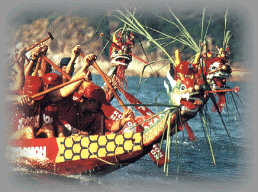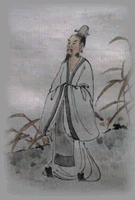 |
 |
Dragon
boat race |
Traditional
painting of Qu Yuan |
Celebrated on the fifth day of the fifth lunar month, the Dragon Boat Festival (Tuen Ng in Cantonese, Tuen Yang in Mandarin) is one of the three major Chinese holidays along with Yuan Tan and the Mid-Autumn Festival.
Like many other observances, the Dragon Boat Festival has a long and complex history. In Chinese mythology dragons are considered to be beneficient beings, rulers of the water world. The passage of the boats, designed to emulate the appearance and movement of the dragons, is said to bless the water, and it is believed that swimming in this ‘dragon boat water’ will help one fend off disease.
As the festival occurs at a time of year when epidemics are common, many customs associated with its observance developed in an attempt to ensure continued health. Healing herbs such as calamus and moxa are hung on the doors of houses, and pictures are displayed of mythic figures who battle the spirits that are believed to cause illness. It is also believed to be a particularly propitious day for collecting medicinal herbs.
Although the Dragon Boat festival most likely began as an occasion for combating pestilence, it has become inextricably linked with the poet-sage Qu Yuan, a statesman who lived during the Warring States period of Chinese history (475-221 BCE). Qu Yuan was known as a loyal and wise counsellor who was set up by a corrupt prince and subsequently lost his office. Deeply saddened, he threw himself in a river on the fifth day of the fifth moon; some fishermen tried to save him, but they were unable to even recover his body.
Mourning his loss, the people began throwing rice into the river to feed his ghost on the anniversary of his death. It is said that one year his spirit appeared and advised the people that the fish were eating the rice intended for him. So he encouraged them to wrap the rice in silk—other versions of the story say tubes of bamboo—and bind it with thread before throwing it in to the river.
Now the traditional dragon-boat races are linked to the attempts to recover Qu Yuan’s body. The offerings of rice once thrown into the river have evolved into the glutinous rice concoctions (zongzi) that are traditionally eaten at this time. There are many different kinds of zongzi, each with its own particular flavour, shape, and type of leaf used for wrapping, and they can be savoury or sweet.
Chinese dragon boat races take place across the globe, and are occasions of much spectacle and cacophony, as the crews paddle to the beat of a drummer, and spectators cheer them on with the clashing of cymbals.